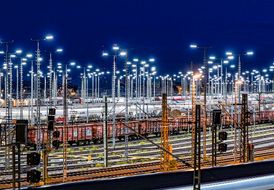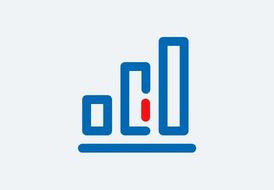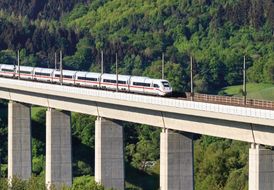Employment conditions
We are continuing to improve employment conditions within the framework of the Strong Rail strategy, based on current and future social developments, as well as employees’ and applicants’ expectations of a modern employer. Issues such as flexibility, participation and individualization are highly important.
In May 2020, DB Group signed the Alliance for Our Railway (2020 Integrated Report) together with the Federal Transport Minister, the EVG, the Group Works Council and the German Mobility and Transport Services Association (Arbeitgeberund Wirtschaftsverband der Mobilitäts- und Verkehrsdienstleister e. V.; AGV MOVE). Against this backdrop, we reached an agreement with the EVG on a comprehensive collective bargaining package in September 2020. In addition to regulations for moderate wage increases in 2022 and a period up to February 2023, the overall package includes numerous agreements on relevant topics for the future. After further negotiations, we reached an agreement with the EVG in October 2021 on additional obligations arising from collective bargaining agreements that supplement the agreements on the Alliance for Our Railway:
- In 2021, employees will receive € 600 and a further € 500 in March 2022 as a Covid-19 bonus. Solutions have been found in the areas of extra pay, education, housing and mobility. For example, additional funds have been made available for employee mobility.
- The regulations apply in DB Group operations in which the EVG organizes the majority of employees in accordance with the German Collective Bargaining Agreement Act (Tarifeinheitsgesetz, TEG).
- The collective wage agreements concluded by DB Group and EVG in September 2020 will continue to apply those operations. In addition to an increase in remuneration of 1.5% as of January 1, 2022, these also include extended protection against dismissal for employees. The agreements have a total term of 24 months to February 2023.
After several rounds of negotiations, we reached a wage agreement with the GDL in September 2021:
- Remuneration will increase by 1.5% as of December 1, 2021, and by a further 1.8% on March 1, 2023. A total term of 32 months was agreed between March 2021 and October 2023.
- As of December 1, 2021, employees will receive a Covid-19 bonus of € 600, € 400 or € 300 depending on the pay category. A second Covid-19 bonus of € 400 was agreed for March 1, 2022.
- DB Group and GDL have concluded collective bargaining agreements for train staff and for the first time also for employees in the workshops and administration of the six train operating companies DB Fernverkehr AG, DB Cargo AG, DB Regio AG, DB RegioNetz Verkehrs GmbH, S-Bahn Berlin GmbH and S-Bahn Hamburg GmbH.
- DB Group and GDL agree that the TEG is the basis for the application of collective bargaining agreements within DB Group. Accordingly, in companies where different collective labor agreements overlap in their scope, the collective labor agreement of the trade union that organizes the most members in an employment relationship in the relevant company (majority collective bargaining agreement) shall apply.
The conclusions take into account the interests of passengers, employees and DB Group in equal measure. They include, among other things, a wage agreement that takes the damaging effects of the Covid-19 pandemic into account and acknowledges the commitment of our employees, especially during the pandemic.
We acknowledge social changes and the wishes of employees when organizing working hours. Our efforts to continuously improve flexibility in working hours help to increase our attractiveness as an employer and are therefore of great importance for employee loyalty and recruitment. In this context we offer, for example, the elective working hours model. Employees can decide whether to reduce their working hours by one or two hours per week, take six or 12 additional vacation days per year or receive an increasedsalary. In 2021, about two-thirds of the employees covered collective bargaining agreements opted for a model with additional vacation within the scope of the regulation.
There are also several options for our employees when using overtime. In addition to the classic options of leave or remuneration, employees covered by collective bargaining agreements can add time credit from overtime, as well as vacation days and remuneration, to an individual long-term account and take paid leave at a later date. At the end of 2021, more than 60,000 employees were using a credit account.
With employer-financed contributions to the DEVK pension fund, DB Group offers an attractive retirement pension to supplement the statutory pension.
Employees covered by collective bargaining agreements are also able to convert time credits from overtime or additional vacation for rotating shift work, shift work and night work, into the company pension plan (CPPs) in full or in part, allowing them to save for their retirement. Both models (contribution to a long-term account and conversion to the CPP) are additionally supported by DB Group.
In the companies with shift and rotating shift work, we are strengthening the participation of employees in the planning and individualization of working hours within the framework of operational working hours projects. As part of a standardized project approach and a project template agreed with the collective bargaining parties and business units, employees are actively involved in the search for suitable, feasible, customer-oriented and sustainable solutions – always in line with employees’ wishes and operational and economic requirements. In 2021, for example, solutions for individual shift planning for on-board staff were introduced at DB Long-Distance with the apps “My time” and “My exchange.” They make it possible to align shift plans as closely as possible to employees’ individual wishes.
Further information can be found in the section Social and fringe benefits.
With our digital housing exchange, we are making it easier for our employees to access affordable housing. At the same time, we have intensified our cooperation with housing companies and updated contractual terms. In 2020, we concluded cooperation agreements with six housing companies that provide our employees with access to a pool of about 600,000 apartments. When selecting cooperation partners, we pay attention to the average rent levels as well as the location of the apartments. In addition, we analyze the needs of our employees in order to be able to plan specific housing projects in the future and implement them if necessary.
We aim to offer our employees a varied, green, flexible and simple mobility portfolio that consists primarily of DB’s own and digitally manageable services. DB company bikes and fare reductions, especially in DB Long-Distance Transport, are the foundations we have laid for employees in this regard. Employees not subject to collective wage agreements and executive employees can also use our bike-sharing service Call a Bike and our Flinkster car-sharing service, with special conditions, and choose BahnCard 100 instead of a company car. We also provide our employees with access to favorable offers for the monthly transport association job ticket for their commute to work. To this end, we are concluding successive cooperation agreements with transport associations.
We were able to guarantee important mobility services throughout the Covid-19 pandemic. Our crisis management team in the area of occupational health management in particular has played an important role in this regard. With its activities and protective measures, our occupational health management follows the German National Pandemic Plan, the occupational health and safety regulations of the Federal Ministry of Labor and Social Affairs (Bundesministerium für Arbeit und Soziales; BMAS), and the precautionary recommendations of the Robert Koch Institute. The objectives of the crisis management team include minimizing the risk of infection at the workplace, maintaining operational processes, maintaining operational infrastructure and ensuring basic supply. The health management team is in constant communication with the health authorities of the Federal Government and the Federal states, the German Federal Ministry of the Interior and Community (Bundesministerium des Innern und für Heimat; BMI) and the BMDV. Health management offers employees and executives assistance, information and support services in order to cope with the Covid-19 pandemic together. The digitalization of health services also makes a contribution to the design of modern employment conditions in this context. In addition, we are focusing particularly on the side effects of the Covid-19 pandemic, such as “long- or post-Covid,” and also how to deal with mental stress during the pandemic. To address this and for ergonomic advice, offers were developed with the help of the social partnership with the BSW & EWH Foundation Family (Stiftungsfamilie BSW & EWH), the Association of German Railway Sports Associations (Verband Deutscher Eisenbahner-Sportvereine; VDES), BAHN-BKK and Knappschaft-Bahn-See (KBS Social insurance for railway employees and seafarers).
Further information can be found in the section Occupational safety and health management.
We offer our employees vaccines to support the Covid-19 vaccination campaign in Germany. To this end, we have set up our own vaccine centers at ten central locations (Hamburg, Hanover, Berlin, Leipzig, Frankfurt am Main, Cologne, Duisburg, Karlsruhe, Nuremberg and Munich) and operate these independently with the support of the company medical service providers PIMA and ASAM prevent. DB’s in-house vaccine centers were initially open from June 2021 until the end of August 2021. As we had sufficient resources of vaccines and medical staff available, the vaccine offer was also expanded to include family members of DB employees and employees of the social partners. A total of about 32,000 vaccines were administered.
DB’s in-house vaccine centers opened again on December 6, 2021. In addition to basic immunization, it is also possible to receive a booster vaccine. The service was again aimed at employees, but was expanded to include family members and employees of social partners as early as mid-December 2021.
We are consistently taking further steps towards establishing new and flexible forms of collaboration. In summer 2021, the fundamental decision was made to anchor mobile working into our everyday work for employees and executives with office activities. In addition, desk sharing and an activity-oriented office concept are being gradually introduced at all office locations throughout Germany.
We are building on the positive experiences of intensive digital collaboration due to the Covid-19 pandemic, the diverse and many years of experience in designing more modern office structures, and the needs of employees for flexible working conditions.



